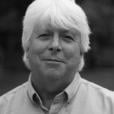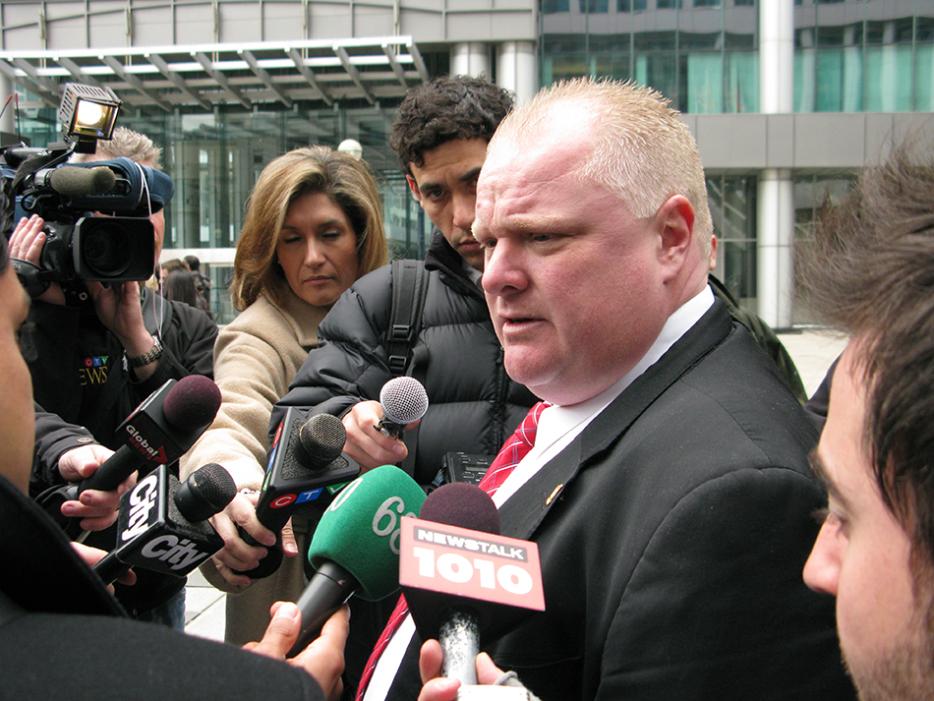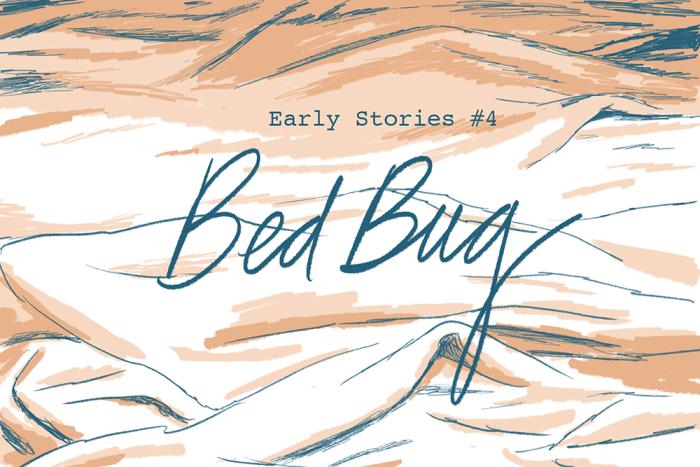On the morning of my grade eight graduation, as families headed home from church for a traditional Sunday breakfast before the afternoon ceremony, I spotted Duncan O’Neill alone on a bench, a brown lunch bag at his side. Duncan had joined our class towards the end of the year, a big kid two years too old for the grade. He wasn’t part of anybody’s world, accepted by neither the popular kids who weren’t so smart nor the smart kids who weren’t so popular.
“A boy in my class is sitting over there by himself,” I said to my mother.
“Ask if he wants to come to our house for breakfast,” she responded right away.
Duncan was happy to join us. He said many times how much he liked the bacon and eggs, each time quickly adding that his mother sometimes made him a breakfast just like this.
I barely knew Duncan and never saw him again after that day. Why he had popped into my thoughts was a mystery until I recognized the similarity to another big kid who didn’t fit in when he arrived at Toronto city council, late in 2000. This one was often loud and aggressive, but I thought I recognized in him a shy, awkward kid who seemed painfully alone.
If Rob Ford had been my grade eight classmate and my mother had seen him sitting without a friend, she would have said, “Ask if he wants to come to our house for breakfast.” Rob would have happily joined us. He would have said many times how much he liked the bacon and eggs, each time quickly adding that his mother sometimes made him a breakfast just like this.
Rob Ford didn’t know my mother. But when she died, in 2007, he drove from Etobicoke to North York on a Friday night. He entered the funeral home quietly and, after paying his respects, left the same way.
*
I do not doubt reports of Rob Ford’s monstrously bad behaviour. Nor would I deny that a beast lurks within, released by alcohol and drugs. My friends often ridiculed and demonized Ford at the same time, as if you couldn’t heap enough scorn on a creature like him. My observation that Rob had many sides to him, and that there must be reasons for the way he was, only irritated them. They saw him as stupid and dangerous, an ignorant buffoon. They wanted him to be simply that. They were uncomfortable with my empathy for the man. Maybe they thought it eroded my belief that Rob Ford was unfit to be mayor. It didn’t. I was the city councillor who thought up the motions that took away Ford’s powers as mayor of Toronto—and made sure they passed a council vote—in November 2013. I took no pleasure in it—quite the opposite—but believed it had to be done.
For two months afterwards, when I passed Ford in the hall, he met my “Hey Rob” with a menacing glare. Then, during the January 2014 council meeting, I watched with apprehension as Rob slid from his seat and walked deliberately towards mine. He was holding a sheet of paper, which he thrust in front of me. Rob’s expression, unreadable at first, became a half smile.
The paper was a football pool, with a spot for me to fill in my picks. He wanted me to play again. “Don’t get me wrong,” he said, making it clear that our football friendship wouldn’t protect me from political payback. “I’m taking you out in the next election. I’m going to smoke you.”
*
The football pool was a holdover from the ten years when we sat two seats apart on Toronto council, before Rob became mayor. He represented the mostly working-class area of north Etobicoke, I the more affluent North York community of Willowdale. When newly elected first-time councillors arrive at the beginning of each term, most are barely visible for the first few months. Not so with Rob Ford. He invited immediate comparisons to the late comedian Chris Farley, whose earnest buffoonery produced one misadventure after another. When Ford exploded from his seat to denounce his spendthrift colleagues, I had a front-row view. Proximity to Ford so rattled one councillor that he changed seats. I was always more curious than anything else. What was beneath all that anger?
Between outbursts, Rob sat silently, seemingly detached from everything and everyone around him. “We need to find a way to relate to this guy,” Councillor Joe Mihevc suggested one day. My seatmate since 1999, Joe was the sort who fostered relationships with nearby councillors. The big guy to our left was hard to reach. But we’d noticed Rob’s obsession with football, and so we started a pool and invited him to join us. Rob never realized that Joe and I knew nothing about the game because, against all odds, our random picks consistently beat his more informed choices.
Rob Ford showed the world many faces, all real but none really him.
When he paid us our winnings, we’d tell him we were donating his money to left-wing causes. He loved that kind of boyish pushing and shoving, and gave the same back the few times he won. One year, he clobbered us in the Super Bowl pool and never let us forget it. He would happily endure weeks of losses for a single day of victory.
Apart from council meetings and a few lunches, Rob and I spent little time together. But I was his football pool buddy, which was not a small thing in his life, I came to realize. After he was elected mayor in 2010, and council divided itself into hostile factions, our football bets ended. Bumping into him at a function more than a year into his mayoralty, I bemoaned the loss of disposable income from my winnings.
The day after, my executive assistant told me, “The mayor’s office is calling, he wants your football picks.” Another staff member stopped me: “The mayor’s staff is e-mailing. They need your picks.” Taking a washroom break, I encountered a senior Ford staffer at the next urinal. “Councillor,” he said, “would you please get in your football picks. The mayor is making us crazy.”
Late in 2013, after I’d initiated the removal of his powers, the Ford brothers were watching football in the “mancave” at Deco, the family label business, when Doug needled Rob for not retaliating against me. “I kicked him out of the football pool,” Rob replied, as if that made us even. After he invited me back the following January, the bets were accompanied by an unusual amount of bravado, mostly about what he was going to do to me in the next municipal election. “I’m giving you a heads-up. You fucked with me, now I’m coming after you. I’ve got a guy who’s going to take you out.” It was as if I had embarrassed him in front of the other kids and he needed to show them he could get right up and push me down.
In the fifteen years I'd known Rob Ford, most of our conversations started with football or hockey and branched out from there. The topics were limited and discussions tended to be short and to the point. But they showed a man struggling to do the best he could. During Sunday morning calls to sort out the pool picks, we’d talk about the challenges of fatherhood, or his plans to become mayor. Later, as he suffered through addiction, his mood could swing wildly. When I made the mistake of once joking that I could have tricked him by altering the point spread for that week’s games, his face turned red and he became cold and menacing.
“You fuck with me, bro, you won’t do it twice. I’ll be knocking on your door.”
Then, when I least expected it, he’d show warmth. As we waited for the elevator one day, I told him I was insulted he hadn’t included me in the Top 10 list of councillors he wanted defeated in the October 2014 election. “That’s because I’ve already got my best guy against you,” he said. As Rob wound himself up, his brother came along, not realizing I was the instigator.
“Okay, Rob,” Doug Ford admonished, in a rare moment of playing the peacemaker.
“Buddy, I’m taking you out like a cheap date,” Rob continued to rant at me.
“Rob, okay, okaaay!” Doug tried again.
Something in the exchange triggered a different Rob. He suddenly grew concerned that I’d be unemployed if his candidate defeated me. “You don’t need to worry,” Rob said reassuringly. “You won’t have trouble finding a job. You’re a smart guy, an educated guy. You’ll be on the radio or write a book or something.”
*
Rob Ford showed the world many faces, all real but none really him. He was a jumble of contradictions: attention seeker and shy loner; bully and kind-hearted friend; a savvy politician who can’t comprehend much of what happens around him; the self-proclaimed “best mayor this city has ever had” and the guy with such low self-esteem that he’ll stare at the floor to avoid eye contact.
But the Rob Ford I know best was none of these. At some point, the ten-year-old inside him made friends with my ten-year-old self. We were the sort of friends who didn’t visit one another after school but looked for each other at recess.
“He has a special relationship with you,” his brother Doug told me several times. “I don’t fucking understand it.”
Neither did I. Not until it struck me how few people tried to connect with the person beneath the protective layers.
“I think Rob doesn’t have any friends, and you’re probably one of the closest friends he has,” Nick Kouvalis, his former campaign manager and chief of staff, told me. “You can talk football, with a little side wager. You can have lunch with him maybe. He doesn’t have anyone like that. He has people who will do things with him—but they want something from him. They want his money. They want his connections. They want something from him.”
On his forty-fifth birthday, Rob was in rehab, so I made him a collection of music from the year he was born. The song list began with “Gimme Shelter” and ended optimistically with “Here Comes the Sun.” When Rob phoned to say thanks, he spoke so warmly it took me a few seconds to recognize who it was.
Several times, I tried to persuade Rob to let that Rob Ford speak with me for this book. He apologetically offered multiple reasons for saying no. His political supporters who “hated” me wouldn’t like it; he had to wait till after the election; since big US networks and screenwriters wanted his story, there was no way he could give it to me. And the biggest reason: “Dougie says not to.”
*
Rob Ford appeared simple but was easily the most complicated person I’d ever known. Every time I thought I had him mostly figured out, he’d surprise me again. Then I began seeing the patterns within the contradictions, the predictable amid the inexplicable. I wondered about the childhood that produced such a troubled adult. As my football buddy became international news, I was astounded at the lack of effort spent explaining Rob Ford’s behaviour rather than merely chronicling it. Since abandoning journalism for politics more than thirty years ago, I hadn’t written much of anything. But I decided that Rob Ford’s story needed to be told, and it didn’t look as though anybody else was going to tell it.
In August 2014, on the final day of his last council meeting as mayor, I went over to Rob to talk football and elections, trying to stay within his comfort zone. But he was in the mood for real conversation.
Documents had been released a day earlier depicting him as a sometimes drunken football coach who mistreated his players. That contradicted how Rob saw himself: a caring coach who expressed it by teaching his players how to win, tolerating neither weakness nor failure.
“It hurt me deeply,” he said of the published reports, touching his chest, more sad than angry. “I was bawling to my brother.” He seemed barely interested in a new poll showing he had moved back into second place in the mayor’s race, a near-impossible feat for any politician with even half his misdeeds.
I asked him what quality in him explained his continued popularity among at least a third of the population. “I think it’s because they see you as an average guy,” I suggested, wanting his reaction to a term he had often used to describe himself.
“You think,” he said sternly, like a teacher knowing I could do better. “You don’t think.”
Uncharacteristically, Rob looked me straight in the eye. “An average guy,” he repeated. “There is no such thing as an average guy.”
*
“Why do people hate me?” Rob asked me on the day before he would learn whether he had a chance to see 2016. He wasn’t angry or feeling sorry for himself at a time when self-pity would be totally understandable. He really wanted to understand.
A few minutes earlier, Rob had received the call he’d been anxiously awaiting. Come in tomorrow at two o’clock, his oncologist told him. Make sure your family is with you. “I don’t like how that sounds,” Rob said. Good news meant a ten-hour operation, followed by two weeks in hospital and months of recovery at home, with the hope that the surgery would be successful. Bad news meant the chemotherapy hadn’t shrunk the tumours enough to operate and there was nothing they could do for him.
After taking the call, he walked back to his council seat and pushed the red button, voting no on a routine item. I remarked on his ability to hold up emotionally under such unimaginable stress. “What am I supposed to do?” he replied. “I can’t go home and cry.”
Mortality wasn’t all that troubled him on April 1, 2015. At school, kids told his children that worms would soon be eating their father. The cruelty shook him, as if he hadn’t examined the dark side of human nature before. “Can you imagine? They get it from their parents.
“People hate me,” he said. I told him that some people hated me too. “No,” he said. “They dislike you. They hate me. I don’t know why.”
I asked Rob if he’d ever heard of a Rorschach test. He hadn’t. People look at ink blots and see different things, I explained. What they see says more about them than about the splotches on the paper. “You’re like the ink blots.”
“I see what you mean,” he said.
*
After the election, Rob had taken Doug’s seat directly in front of me. Unlike his brother, he rarely turned around. I thought maybe he was choosing to be unfriendly. Then, looking at the back of his head during the April 2015 meeting, I realized Rob didn’t really know I was there. He was only aware of what was in his field of vision. When I sat down next to him, Rob was happy to talk. We negotiated a wager on that night’s Toronto Maple Leafs game against the Tampa Bay Lightning. Rob shrewdly got the better end of the deal. Later, we talked about trying to pick up some tickets. On the eve of the cancer news, Rob saw it as possibly his last chance to take his seven-year-old son, Dougie, to his first Leafs game.
That afternoon, Ford went to a funeral home in Etobicoke to give his condolences to a friend who had lost a close relative. A casket was the last thing Rob wanted to see, but he felt obligated to go. By the time he’d left the funeral home and picked up Dougie, the council meeting was almost over. So he went straight to the hockey game, taking his seat midway though the first period. ROB FORD GOES TO LEAFS GAME, SKIP COUNCIL DURING WOODBINE DEBATE, read the headline on a Toronto Star online news story. Accompanying it was a large photo of Rob, posing with a fan. The description beneath it read: “Councillor Rob Ford, who was often criticized as a mayor for missing votes at Council, was back in the old habit Tuesday night.”
In fact, the vote on whether to study expansion of gambling at Woodbine took place while he was at the funeral home, long before the hockey game started. He missed only a few inconsequential minutes of the meeting in order to give his son a lasting memory, just in case. I wanted the people who thought that was the wrong decision to have their pictures in the paper.
“Well, we can now add Worst Councillor Ever to Worst Mayor Ever,” wrote rosedale71 in the comments that accompanied the article. “Not at a crucial council vote? But, but I was at a funeral visitation. No, you were at a hockey game,” wrote Frey@99. “All those years he’s been going to sporting events … never with his son … What a selfish creep,” another opined.
For the first time, I felt as though I was looking out of Rob Ford’s eyes. I was angry at the unfairness of the story and the unkindness of the comments. At the game, Rob had been focused on his young son, asking if he was hungry or needing to use the washroom. When Dougie got tired during the second period, Rob left early to get him home to bed. A regular good dad.
The next day, I told him to ignore the story and the online comments. “I try to, but I can’t,” he said. “It hurts.” Rob talked about how difficult it was that his kids were old enough to understand that he might not be with them much longer. He feared death, but the dread he spoke about that afternoon was all about his kids—that maybe he wouldn’t get that second chance to be the father he wanted to be, or that he might relapse into drug addiction. He told me about that awful time in his life when all he could think about was how and when he could get more drugs. “I don’t want to go back there,” he said. “I don’t want to end my life that way. I can’t—for my kids.”
*
“People either love me or they hate me,” Rob said. “There’s no in between.”
We talked about how, really, everyone is some combination of good and bad.
“I’m just an average guy,” Rob said.
I reminded him that he’d once told me there was no such thing as an average guy.
“There isn’t,” he said, looking around the council chamber. “Where are they? If there’s an average guy, then show me one. It doesn’t exist.”
Before I could point out the contradiction, Rob Ford finished his thought.
“Except me. I’m the only one.”
I started to laugh. Rob laughed too. After talking about cancer and death and unkind people, it helped to laugh. But he was serious. “I can relate to everybody,” he explained, no longer laughing. “I consider myself a normal, regular, average guy.
“The only average guy.”
This piece is adapted from The Only Average Guy by John Filion.






